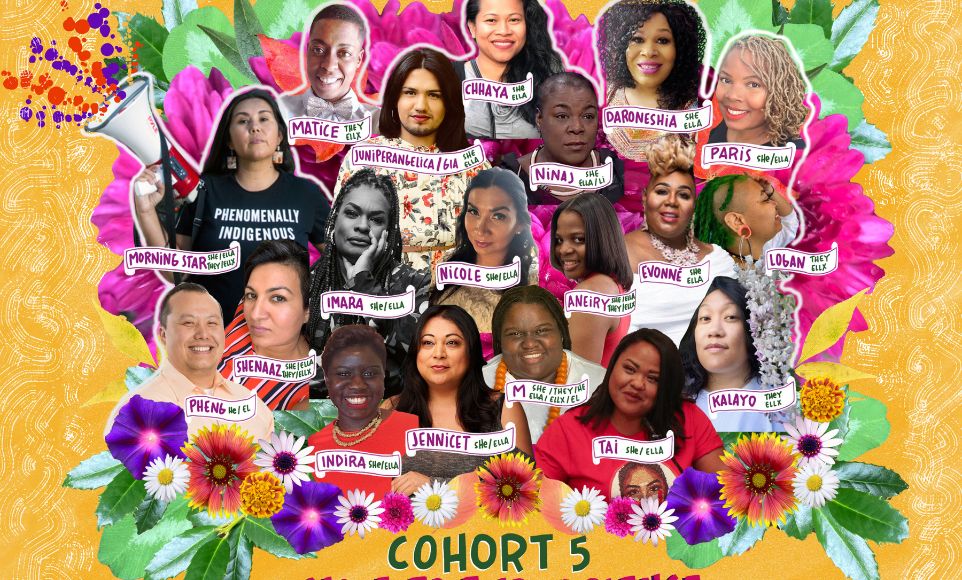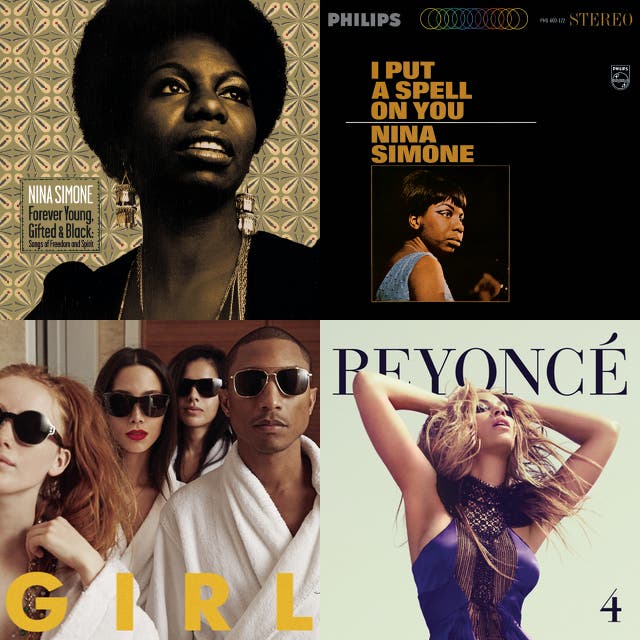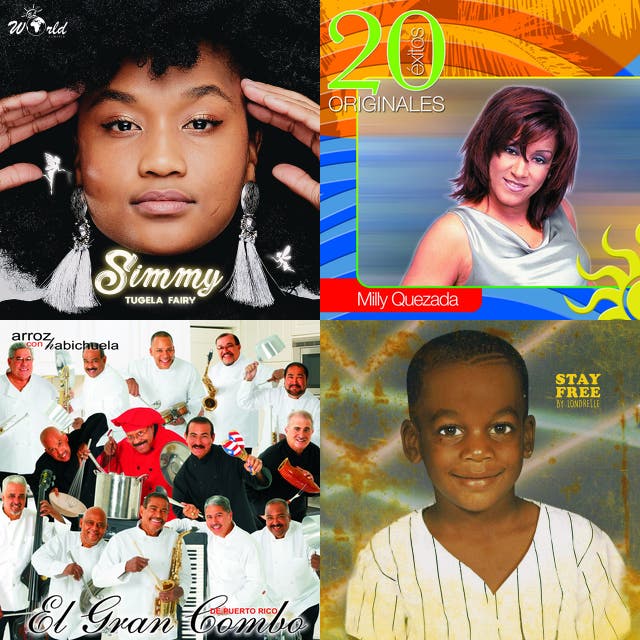Movement Maker Profiles: Juniperangelica Gia Loving
Juniperangelica Gia Loving is a queer, trans Latina, mother, and community organizer based in the Bay Area/Ohlone Land, originally from El Monte, CA/Tongva Land. She is an artist, strategist, scholar, designer, speaker, Libra, and lover. Juniperangelica is the Associate Director of Gender Justice Leadership Programs at GSA Network & Transgender Law Center.
Who are your people?
My people are people that I feel safe with. I very much find value in feeling safe and I'm very much connected to who I'm around. This changes easily when I'm around new people or around people I'm comfortable with, but I think at the very root of it, it's people who I just feel safe with…not necessarily that they'll protect me, but they're down to do what I need to do and we can do this together. I think that's the basis of it.
I also think that the family that I come from, also is strengthening in terms of my people. I feel like there was a moment where I started to divorce myself from my biological family, really just to keep myself alive. I think over the past few years, we all have really made an effort in nurturing and maintaining our relationships. I'm starting to feel safe again. I feel once again that the people I come from, biologically also, are starting to also become my chosen people as well. And my kids, of course; my kid is my person. If there's one person in the world that matters to me, it's my baby.
What brings you to this work?
I really think that the core of why I'm part of this work is survival. I am a very creative person, I have a lot of cool skills that I'm proud of, and that I'm trying to sculpt. I have come to terms with how I can really use them and then target them to create change in the world. That's something that I'm capable of and that's what I've been doing. That's what I enjoy doing, not only because on the base, I feel like I'm trying to be confident in my own skills, as well as I'm trying to survive, and I want the world to be a better place. I think similar to many parents, I want my kids to have a safer world and I want their survival to be more guaranteed than mine is.
I entered this work when I was in high school. I was homeless and queer. GSA Network had activist camps. For me, that meant overnight housing, that meant food and that meant other queers. It was wild. For me, it was very much I was seeking community. What has kept me in this work for the last 9 years has been trans power.I really believe that other people I'm around have been learning from past generations and I've been creating so many more possibilities. I just really believe in this work.
What aspect of your movement work brings you the most joy?
Two things come up when I think about joy and my work. There's many more things but maybe two things that rise to the top. One: I think it's cool to work with young people as a young person myself and also in these transitional few years in which I think I'm exiting youth. Two: I feel like it's also a unique opportunity to work with folks who are my age and to be reminded of the power that we hold, and also just be reminded of the fact that our movement history, so much of our power comes from young folks and their willingness to try things out and to fuck up and try again.
I think what comes up that always feels true for me in the work, but also just my life is just in moments when I'm able to be around other Black and brown trans friends. I think there’s a magic that happens when we're able to just stop code-switching. After work, after relationship building, of course, but it's easier to just let loose with your own people who really understand you. I think those moments in work, in personal life, that just keeps me going as a person.
What moves are you making to end violence?
That's a good question. Love the wordplay. I think that's an interesting question because I have a personal relationship with violence, an idea of violence. When my family was homeless for about six years when we were in high school and my two years of community college, in those years we experienced just a multitude of layers of violence, from state violence to interpersonal.
I feel like of course, that left me with a lot of trauma and left me with a lot of things that I work with now, but I think the first move I'm making to end violence is simply by not repeating what my body feels like is instinct. Parenting myself through the way I treat myself, the way I talk to myself. I'm really working hard to just not repeat, or just try to break that generational violence that I watched, that I heard my mother-- I heard some stories that my mom and my dad told me from their childhood, and I watched that play out in our childhood.
Then I'm watching that kind of violence of play out in the advice that I'm getting on how to raise my own kid. I'm like, "Oh, no, this needs to stop." I think the first move is really just trying my best to learn, heal and to stop the violence from happening to my children. I think from there, it just ripples out.
As a manager, I'm trying to stop violence from happening and I'm trying to be a better supporter of my team. As an organizer, I'm trying to really work with folks who don't have full-time paid organizing jobs. I'm trying to partner with folks and respect the expertise and power of local organizers coming from two national organizations.
At the center of it I'm trying to hold and protect the belief that this world can be free from violence. I've always believed that world peace is possible. I've always also felt so embarrassed saying that because it can feel like no one thinks real peace is possible. I'm trying to hold on to that naïve, young Gia belief that it's possible, because that's the only thing that keeps me going. I think at that core, and my small practices of trying to end violence that I've witnessed or encountered, I think that is where I start in terms of my views on violence.
How would you describe your leadership strengths?
I think my leadership strengths come from three places. I think one comes from experience or a deep desire to listen to people. I really value that. My leadership comes from either the data I have in my mind simply through experience or the data that I collect from others, because I actually want to hear, I want to use that data to understanding that everything is data (amb). I think it comes from experience, or the value of experience. I think it comes from a place of love. I'm really trying to sculpt together how I word it. I hear Lady Diana, "I lead from the heart, not the head."
That was my quote, that was my mantra my whole childhood. I feel I'm getting a different vocabulary for that now, but really just leading from a place of like-- it's very informed and research-based and empirical, but also it's like what feels good, what feels like my body wants to move that work, that place, and really try to trust them.
The last one I had, yes, it comes from a place of hope. I think that a recent essay read by Mariame Kaba is Hope is a discipline. I feel the idea of hope as a discipline gave me a different vocabulary for how I describe or how I value that naïve(?) optimism.
I call it naïve optimism not because I think that of it, but I simply I'm trying to-- It's not even naïve because it's based on facts and research, but my leadership comes from a place where I believe in what I'm trying to achieve and I just refuse to do work that I don't believe in, because it's like, I'm not going to fucking waste my time on this flying rock through the stars in work that I don't believe in. That's literally new, this firmness. That's months old, but it's this power training me. I think it's such a cool thing that I'm working toward and learning from other people. I'm just soaking in all the knowledge, especially from places like MEV.
What keeps you in this work?
A paycheck. [laughs] I'm trying to get out of generational poverty and I am determined to survive. In America, that means I need money. I'm determined to help not only set my kid up for success, but all the queer babies. But really, I think motherhood is my gig; it doesn't have to be my money. I'm really good at locating resources and giving to my people. I think I'm in the work because I'm being realistic around where the resources are and I'm trying to be realistic around what my people need to survive. I balance it out.
My work exists in the formal organizational work and my work exists in all the other hours; when I'm off the clock it's like the work just continues, but in a different way. I think that's the realistic answer. I wish that people didn't have to be paid to defend our humanity. That's a reality. I think spiritually, I'm in the work because beyond the tactical things to keep me alive in terms of having an income, I believe in being free, I believe in what I'm doing, I believe in the world we’re creating.






.svg)
.svg)





